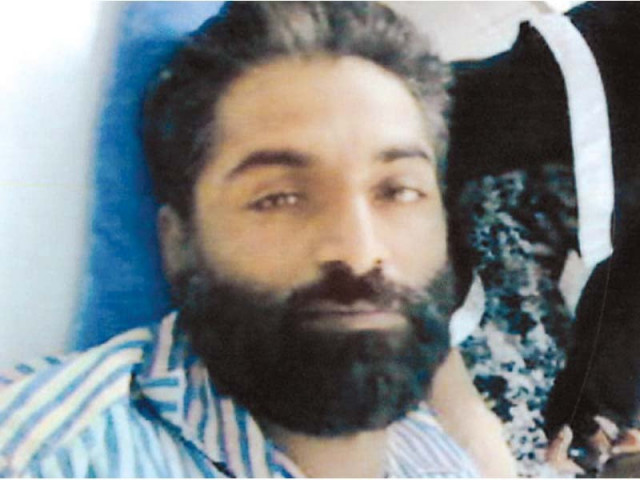Execution of paraplegic convict postponed
She appealed to President Mamnoon Hussain to commute her son’s death sentence to life in prison

Abdul Basit, 43, was scheduled to be hanged at dawn on Tuesday. But when the jail superintendent, the judicial magistrate and the medical officer appointed to oversee the execution realised that they could not keep the convict standing long enough, the hanging was suspended, an official at the Central Jail Faisalabad told The Express Tribune.
He said they have written to the Punjab Home Department for further instructions in light of the orders of a three-judge bench of the Supreme Court, which had directed the jail authorities against violating any laws in carrying out the execution.
Basit’s mother Nusrat Parveen said the jail officials had not informed the family of postponing the hanging. “He was scheduled to be executed at 5:30am. Our family spent the entire night outside the jail in the rain. But it was not before 7am that we came to know of the suspension – and that too through the media. His imminent death is hanging over our heads like a sword of Damocles.”
She appealed to President Mamnoon Hussain to commute her son’s death sentence to life in prison. She said Basit has two sons, aged nine and 12. “We haven’t told them that their father is on death row.”
Yasir Shahbaz, the spokesman for the Justice Project Pakistan (JPP) that has been lobbying against the death penalty, said prison rules did not explain how to execute a paraplegic convict. “Pakistan Prison Rules states that the rope for hanging must be the correct length, to avoid prisoners facing protracted strangulation (if it is too long) or decapitation (if it is too short),” said JPP project director Sarah Bilal.
The rules state that the rope’s length is determined by measuring it from the lower jaw of the condemned prisoner as he stands on the scaffold, she said. “The rules cannot be followed in Basit’s case, leaving open the possibility of a botched hanging.”
A day earlier, Amnesty International had issued a statement urging Pakistan to halt the scheduled hanging and immediately impose a moratorium on all executions.
“Instead of debating the logistics of how to put a man in a wheelchair to death, the authorities should grant reprieve to Basit,” said Sultana Noon, Amnesty International’s Pakistan researcher. “This case has drawn widespread attention to the cruelty of the relentless conveyer belt of executions in Pakistan.”
Basit was convicted of killing Advocate Asif Nadeem on March 31, 2008 in Okara. He and his wife were at Nadeem’s house to offer their niece’s hand in marriage to the lawyer.
Nusrat claimed that Nadeem had misbehaved with them, and though there was a physical confrontation, no one knows who actually gunned down the lawyer. “How could Basit have committed an offense in the presence of his wife?”
Published in The Express Tribune, September 23rd, 2015.


















COMMENTS
Comments are moderated and generally will be posted if they are on-topic and not abusive.
For more information, please see our Comments FAQ